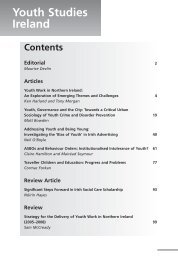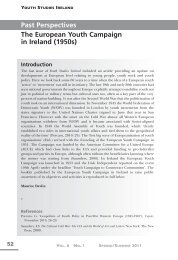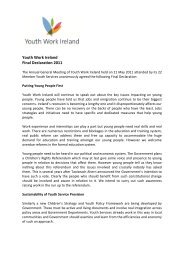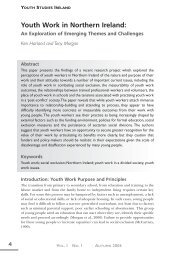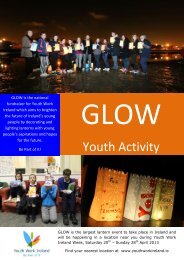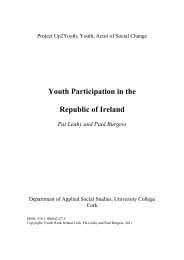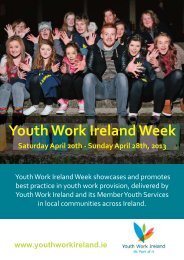Voices of Hidden Young Carers in Cork, Joe Finnerty and Cathal O ...
Voices of Hidden Young Carers in Cork, Joe Finnerty and Cathal O ...
Voices of Hidden Young Carers in Cork, Joe Finnerty and Cathal O ...
Create successful ePaper yourself
Turn your PDF publications into a flip-book with our unique Google optimized e-Paper software.
YOUTH STUDIES IRELANDMost <strong>of</strong> the current young carers expressed <strong>in</strong>terest <strong>in</strong> meet<strong>in</strong>g with other youngcarers <strong>and</strong> <strong>in</strong> participat<strong>in</strong>g <strong>in</strong> a <strong>Young</strong> <strong>Carers</strong>’ Group if one were established. Theprime motivation was to combat their sense <strong>of</strong> isolation <strong>and</strong> to be able to talk with otheryoung carers who would underst<strong>and</strong> their experiences.Do<strong>in</strong>g this you feel very alone. You feel that there’s nobody else around. So it wouldbe nice to f<strong>in</strong>d out how other people deal with it <strong>and</strong> stuff. I th<strong>in</strong>k that [a youngcarers’ group] would be a very good idea alright.ConclusionsIt is clear that be<strong>in</strong>g a hidden young carer has significant implications for the lives <strong>and</strong>wellbe<strong>in</strong>g <strong>of</strong> the young people <strong>in</strong>volved. Be<strong>in</strong>g a young carer can lead toimpoverishment, not only <strong>in</strong> terms <strong>of</strong> f<strong>in</strong>ancial hardship <strong>and</strong> lack <strong>of</strong> basic resourcessuch as food, but also <strong>in</strong> terms <strong>of</strong> affect<strong>in</strong>g education <strong>and</strong> employment opportunities,social lives <strong>and</strong> <strong>in</strong>teractions, <strong>and</strong> physical <strong>and</strong> mental health. Furthermore the lack <strong>of</strong>adequate <strong>in</strong>formation, supports, <strong>and</strong> pr<strong>of</strong>essional <strong>in</strong>terventions has exacerbatedalready difficult situations for young carers, <strong>and</strong> it is clear that adequate pr<strong>of</strong>essionalsupports <strong>and</strong> <strong>in</strong>terventions are essential <strong>in</strong> mediat<strong>in</strong>g the impact <strong>of</strong> car<strong>in</strong>g on youngpeople’s lives.A number <strong>of</strong> important conclusions emerged from the research, with implicationsat the level <strong>of</strong> policy formulation, service plann<strong>in</strong>g <strong>and</strong> practice <strong>in</strong>terventions.A greater level <strong>of</strong> awareness <strong>of</strong> the existence <strong>and</strong> <strong>of</strong> the needs <strong>of</strong> young carers onthe part <strong>of</strong> social pr<strong>of</strong>essionals such as social workers, youth workers, communitydevelopment workers, health pr<strong>of</strong>essionals <strong>and</strong> home-school community liaison<strong>of</strong>ficers is essential to help <strong>in</strong> early identification <strong>and</strong> <strong>in</strong> devis<strong>in</strong>g appropriate responses.For other organisations work<strong>in</strong>g with families where young carers may exist, strategiesfor heightened awareness <strong>of</strong> their needs should be devised.The <strong>in</strong>terruptions/ dilution <strong>of</strong> formal educational experiences caused by car<strong>in</strong>gresponsibilities places hidden young carers at a considerable disadvantage <strong>in</strong> terms <strong>of</strong>life chances, labour market participation or acquisition <strong>of</strong> formal qualifications.Nonetheless, the research outl<strong>in</strong>ed <strong>in</strong> this article has revealed that despite theadversities they endure, young carers build up significant skills <strong>and</strong> resources <strong>in</strong> tak<strong>in</strong>gon care responsibilities. In this regard consideration should be given to policy<strong>in</strong>itiatives aimed at giv<strong>in</strong>g recognition to these experiences <strong>and</strong> skills through certifiedtra<strong>in</strong><strong>in</strong>g <strong>in</strong>itiatives, EU led vocational tra<strong>in</strong><strong>in</strong>g <strong>in</strong>itiatives <strong>and</strong> distance learn<strong>in</strong>gprogrammes, <strong>in</strong> l<strong>in</strong>e with recent proposals for recognition <strong>of</strong> adult carers (see forexample Government <strong>of</strong> Irel<strong>and</strong>, 2006: 6).F<strong>in</strong>ally it is evident from the literature <strong>and</strong> policy review that <strong>of</strong>ficial awarenesslevels <strong>of</strong> the existence, contribution, needs <strong>and</strong> experiences <strong>of</strong> hidden young carers <strong>in</strong>Irel<strong>and</strong> is uneven <strong>and</strong> needs to be strengthened. Future policy documents shoulddirectly acknowledge these young carers <strong>and</strong> highlight the necessity for policy <strong>and</strong>support measures to meet their needs. Hav<strong>in</strong>g said that, policy responses to thenegative impacts identified <strong>in</strong> the research must be carefully considered. Special<strong>in</strong>itiatives, while welcome, must be sensitive to the dangers <strong>of</strong> isolation, stigmatisation<strong>and</strong> tokenism aris<strong>in</strong>g from targeted <strong>in</strong>terventions. S<strong>in</strong>ce the burden on young carers isalso bound up with the absence <strong>of</strong>, or lack <strong>of</strong>, access to services <strong>and</strong> supports for those24 VOL. 4 NO. 1 SPRING/SUMMER 2009



